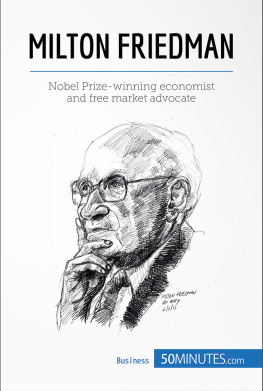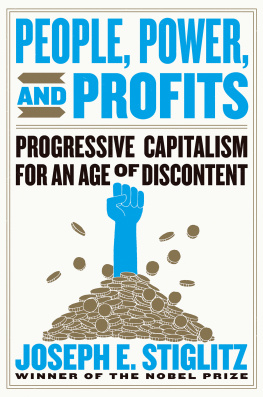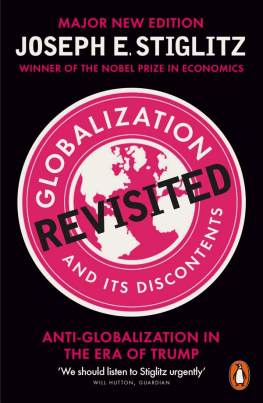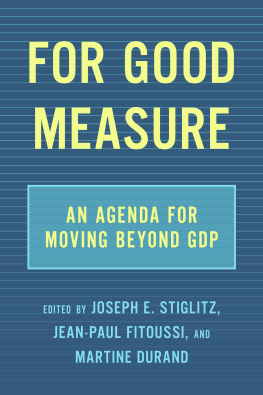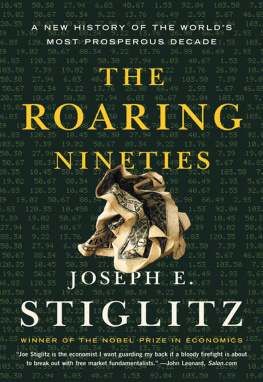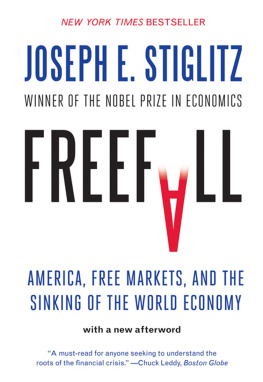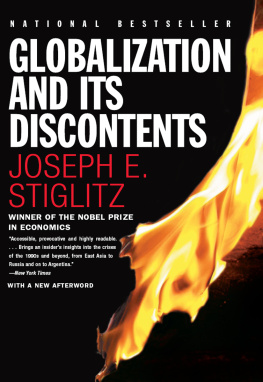JOSEPH STIGLITZ
- Birth: Born 9th February 1943 in Gary (Indiana, United States).
- Background and current work: Joseph Stiglitz is one of the most renowned personalities of the new Keynesianism or New Keynesian economics. He is also one of the pioneers of information economics.
- Notable works:
- Principles of Economics, 1993.
- Globalization and its Discontents, 2002.
- The Roaring Nineties: a New History of the Worlds Most Prosperous Decade, 2003.
- Making Globalization Work, 2006.
- Economics, 2006, in collaboration with Jean-Dominique Lafay (born in 1944) and Carl E. Walsh (born in 1949).
- Freefall: America, Free Markets, and the sinking of the World Economy, 2010.
- The Price of Inequality, 2012.
- Recognition: He received the Nobel Prize in Economics in 2001, together with George Akerlof (born in 1940) and Michael Spence (born in 1943) for his contributions to information economics.
- Key concepts:
- Econometrics: A branch of economics that uses statistics and various mathematical tools to model the economic reality and the phenomena related to it (growth, inflation, etc.).
- Globalization
- Human Development Index (HDI): An indicator to measure the human development of each country. It complements the GDP per capita (which does not reflect individual and collective well-being) with life expectancy, the level of education and the standard of living.
- Information economics: A branch of economics based on the acknowledgement of asymmetric information in markets in order to study their impact on economic decisions.
- International Monetary Fund (IMF): An international institution whose role is to ensure financial stability on a global level and facilitate international trade.
- New Keynesianism: Also called New Keynesian economics, this trend of economic thought emerged in response to the new classical macroeconomics. It draws on the approach of John M. Keynes (British economist, 1883-1946) and complements his theory by analyzing the microeconomic foundations of macroeconomics, particularly in explaining price rigidity by imperfections in the information. This should not be confused with Neo-Keynesian economics.
- World Bank: International institution that is part of the specialized agencies of the UN. Its role is to advise developing countries and grant them loans as part of the global fight against poverty.
The real debate today is about finding the right balance between the market and government. Both are needed. (Stiglitz, quoted by ALTMAN (Daniel), Managing Globalization: Questions & Answers With Joseph Stiglitz, in The International Herald Tribune, 2006)
Stiglitz regularly calls for the intensification of dialogue between governments and markets, and even more so between markets and households. As a confirmed New Keynesian, he considers that the austerity policies implemented by countries to overcome crises are often illogical. With regards to the efforts undertaken by the United States, he adopts an uncompromising attitude and stresses their inefficiency by, amongst other things, highlighting their inefficiency, mainly criticizing deregulation policies, the decline of progressive taxation and the narrowing of the social safety net (The Price of Inequality, 2012).
This is not the first time the Nobel Prize winner has denounced the policies of large institutions. He is, of course, known for his accusations addressed to the World Bank and the IMF, although he held the position of Vice President for four years, which makes his comments all the more challenging.
The aim of this eclectic economist (an expert in econometrics, political economics and development economics) is to qualify certain regularly used economic models. He also works towards the realization of a true democracy based on an effective dialogue between experts and laymen, and especially on equitable access to knowledge.
HIS LIFE: PORTRAIT OF A DEDICATED AND ALTERNATIVE NOBEL PRIZE WINNER
JUSTICE: A COMMON THEME IN THE STIGLITZ FAMILY
Originating from Gary, an industrial city of the state of Indiana dominated by the middle class, very early on Stiglitz acquired, thanks to his parents, a strong sensitivity for justice and fairness. Firstly, Charlotte, his mother, was a teacher in a public school where the vast majority of students came from families living in extreme poverty. Moreover, his father, Nathaniel, was an insurance salesman which was guaranteed to influence the work of his son and vigorously defended the ideas of the Democratic Party, including the right of domestic workers to benefit from social security.
A BRILLIANT ACADEMIC CAREER
Despite the anecdotal results of a personality test that predestined him to become a rabbi, Stiglitz chose to attend college. He began his academic career at Amherst College (a school in Massachusetts with strongly liberal views) where he spent three years before being directed by his teachers, who had already noticed his great analytical skills, to the Massachusetts Institute of Technology (MIT). He participated in several research projects, particularly alongside Professor Hirofumi Uzawa (Japanese economist, 1928-2014), known for having initiated the field of mathematics applied to economics and modeled the theory of growth in neoclassical theory.
Thereafter, Stiglitz experienced a series of successes: he received a doctorate in 1967, at barely 24 years old, became a professor at Yale University at the age of 27, then a member of the Econometric Society, the foundation of this discipline, two years later. He also held several professorships at the universities of Stanford, Oxford, Princeton and even Nairobi. To describe his academic career as brilliant would be an understatement.
Among his strengths, his mastery of the econometric tool led him to take part in many debates on the analysis of issues relating to economic policies, at a time when philosophy and ideology were put aside in favor of mathematics. Furthermore, his interests are not confined to a single branch: political economy, development economics and, of course, information economics have all benefited from Stiglitzs contributions.
FOUNDER OF INFORMATION ECONOMICS
Stiglitz collaborated with Andrew Weiss (American economist, born in 1947) to criticize the classical model of the credit market, which, according to them, does not take into account the importance of asymmetric information. Their article, Credit Rationing in Markets with Imperfect Information, was published in 1981.
Andrew Weiss
This American economist worked as a consultant to the World Bank and the United States National Research Council, a governmental research organization, and as a member of the Econometric Society. In addition to several research articles, he is also the author of a book entitled Efficiency Wages: Models of Unemployment, Layoffs and Wage Dispersion, published in 1991.
A THEORIST AND POLITICIAN
Although Stiglitz distinguished himself mainly in the academic field, he has always advocated a connection between academia, policymakers and lay individuals. His career is not limited to the field of education: he also held several political positions during his life. In 1993, he joined the team of President Bill Clinton (Democrat, born in 1946) as a member of the Council of Economic Advisors and was appointed chairman in 1995.


